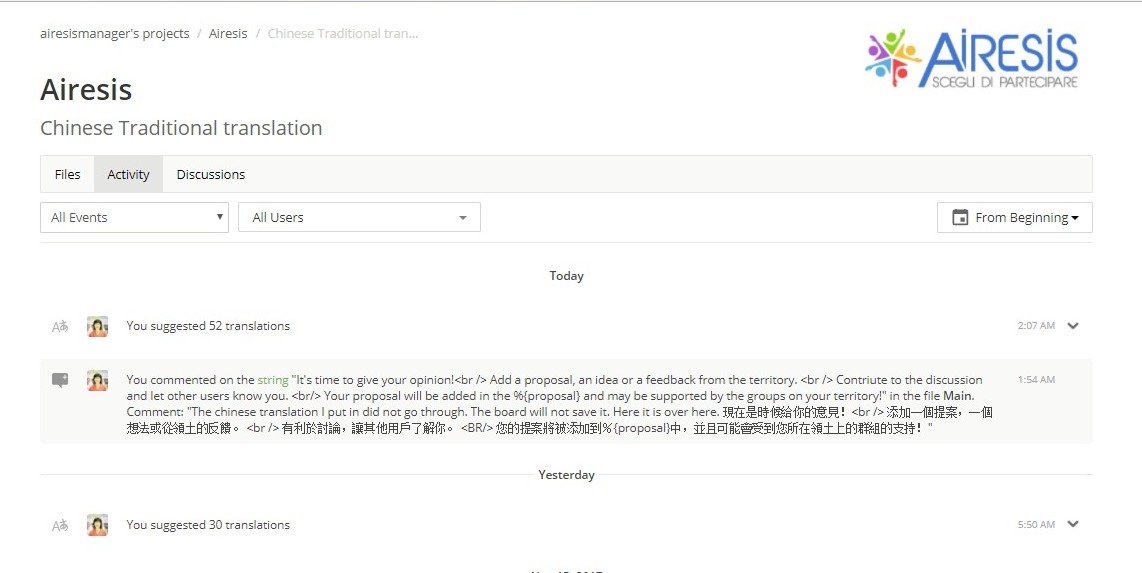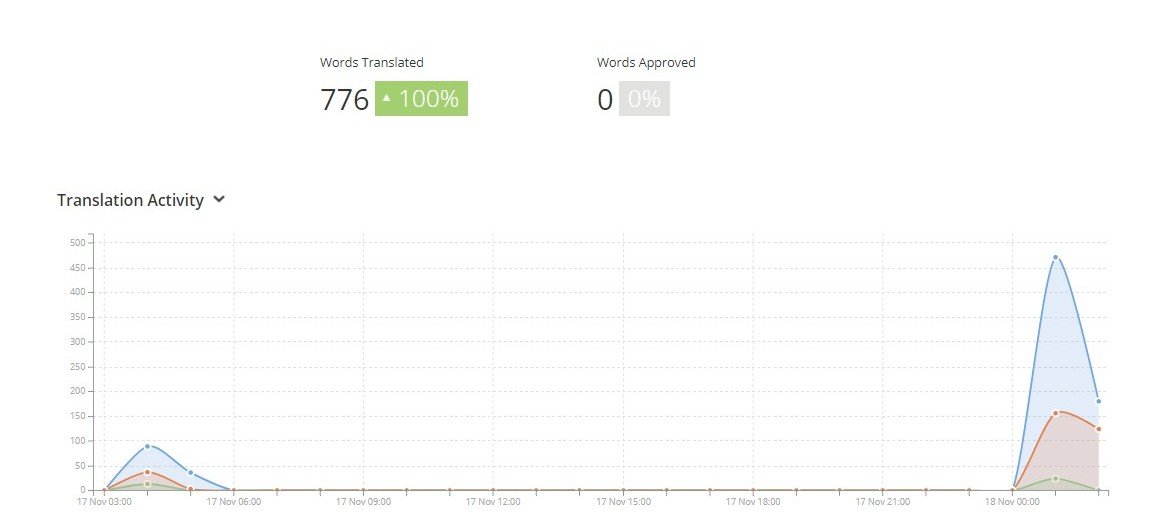Contribution to the Open Source Airesis Project
I started translating Airesis Open Source Project last week. When I began, a couple of people had started the translation and I thought I could bring the project to finish at 100% in one go. Apparently not. Only when I started, did I realize there are many hidden pages under the 'main' heading. So this marks the Part 8 of my translation.
To make the work easier for the moderators, I will put the previous translation post here so that you can review the progress easier as I am not the only translator you follow:
Airesis Translation Work in progress
Here is the list of posts for the moderators to click on to check the work:
- Airesis Translation Part 1 & 2
- Airesis Translation Part 3 - No link as it was not approved
- Airesis Translation Part 4, 5, 6
- Airesis Translation Part 7
Traditional Chinese Words Translated - 776 Words with 82 strings
Here is a screen shot that the translation is done by me. I started it 2 days ago, continued on it yesterday, and finished this section of 24 pages today.

Apparently these 82 strings have a portion with long strings of paragraphs because of the tutorial work involved. This is why the total amount of words is much larger - 776 words in just 82 strings.
Here is the timeline of the translation activities with the 776 words.
I print screen the 'day' as it is easier to see how much I contributed to this Part 8. If I print screen the overall, it shows the sum total of previous work. So I decided to streamline here what I did for Part 8 only, to make things easier for moderators to review.

Paragraphs translation
The translation this time involves a lot of paragraphs and sentences. So this time round, I decided to just type them in rather than reading through what is suggested and then make modifications. I find it much easier to just type it in than to edit another person's work.
Here are some samples that I did for this part 8.
Example 1: for this long string of paragraph, I typed in my translation.
設置您的地理利益邊界.
如果 Airesis 知道您感興趣的區域是什麼,
它就可以建議您的團隊遵循
並顯示與您的區域相關的有新建議.
I find that it is more efficient that way than to 'edit' the suggest ones.
Also in the middle box there, I put them in this format so that it is easier to read than long strings of words going all the way to the end. I think we need to make the formatting easier for the proof-reader to go over also.
Example 2: Another long string of paragraph describing the suggestions
這裡你是最活躍的團體在你的利益邊界內的領土.
選擇您想參與的專案, 這樣您就可以與他們取得聯繫並參與他們的活動和建議.
點擊一次選擇,再次點擊取消選擇。
Example 3: Another long string of paragraph describing the tutorial
這個簡短的教程將幫助你在平台內的第一選擇。
這是您的桌面:在這裡您可以找到所有需要與您的地區保持聯繫的信息。
您可以管理您的建議和團體,查看您周圍的事件並與其他公民聯繫。
It turns out that the 'main' section of this Part 8 have a lot of tutorial instructions. This can account to why the strings are so long totaling to 776 words.
Example 4: Another long string regarding about the estimation of evaluation
So for this one, I decided to put in my input by typing it in.
成熟度欄位於左側的橫向菜單。
條形圖顯示參與者對提案的批准成熟度。
您可以建議提案的文本是否完整,或使用欄下方的兩個按鈕。
提案的編輯必鬚根據其他參與者的貢獻來撰寫文本。
當提案的文本發生變化時,您將有可能建議您是否喜歡新文本,並因此修改以前的評估。
條形的顏色顯示提案是否準備進入投票階段,
而長度顯示討論結束之前還剩多少時間和/或評估。
Trying out New Way to do translation better & also easier for moderators to review our work
Utopian.io is in an evolving stage, so I find the need also to change the way we post our translation so as to make the presentation easier for the moderators to read and also at the same time to show proof of our work that we have completed the necessary translation for that area.
Some apps and projects are easier to translate like the other one that I did couple of weeks ago because they were just computer language, like short phrases. There is no additional value with making new suggestions because when there are about 8 or 9 phrases for you to choose, usually 4 or 5 of them are correct.
But with sentences and paragraphs embedded in the tutorial such as this one, then time is needed to review the suggested ones. But I find that it is easier to just type in our own and put in our suggestion.
Making more suggestions
From the recent talks about how we can improve our translation work, I did something different for this one. In the past, if the suggested one is good for the phrase, I didn't bother making any suggestion. But then this time round, I had a new thought.
The thing is that with Crowdin translation, there needs another proof reader to come in to check and decide or finalize which translation is good.
So I was thinking that as a translator, we can also make some new suggestions even to some of the short phrases. This will provide more 'suggestions' for the proof-readers to finalize which one is good.
Some of the new ones I suggested are probably just as good as the ones suggested, so maybe we can do that extra step and let the proof reader to decide later on.
So this is what I had added to this Part 8 translation and that's why it had taken more time to finish the 24 pages.
I am wondering if doing something like this can add more **'quality' **to translation. But the downside is that it slows down the translation process because more time is put in to give more suggestions (even though the ones suggested are correct) but perhaps in the long run, it might be good for the overall quality since later on, the proof readers can come in 'fresh' and have more suggestions to vote on for the final approval.
Feedback are welcome as always from the moderators.
Proof Link of my Translation work from Crowdin
Here is the public link of the Chinese Translation to the Airesis Part 8
https://crowdin.com/project/airesis/zh-TW/activity
Here is the Github Link:
https://github.com/coorasse/Airesis
Other people can contribute to the Github link and give them more feedback.
Thank you for your attention,
Rosa
@rosatravels
Thank you for reading this post! Hope others can also contribute in the translation to get this project go global.
谢谢你的阅读!希望你喜欢。如果你喜欢我的分享, 请点赞并跟随我。
You can contact me at Utopian here: @rosatravels
You can contact me at Steemit here: @rosatravels
You can contact me at my Website here: http://LearnPianoWithRosa.com/
Posted on Utopian.io - Rewarding Open Source Contributors
